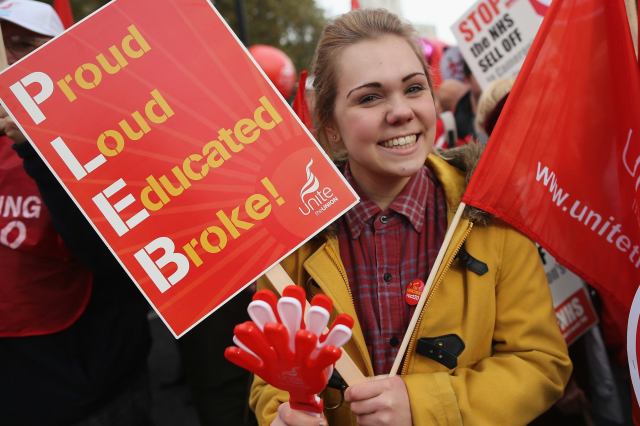Credit: Dan Kitwood/Getty Images

Those who seek to defend capitalism have been having a rough time of late. Despite the UK having a record high employment rate, many people seem to be losing faith in the system.
In a sense this is unsurprising; for too many people, the system isn’t working. While unemployment is low, employment isn’t giving people what it’s supposed to. Wages remain below the pre-crash peak, and most people in poverty are now in a working household. That’s partly due to woefully poor productivity growth, but it’s also about how wealth is shared. Even before the crash, productivity and average pay had decoupled – increases in GDP are no longer benefitting the majority of workers.
Beyond wages, for too many people, work is a miserable experience. We’ve seen a massive rise in insecure forms of work – including zero-hours contracts. Too many people are stuck in low-pay jobs with little chance of progression. And just one in three workers feel able to influence decisions at work. In this context, with millions feeling left behind and lacking a voice at work, it is no surprise that the ‘take back control’ narrative had such resonance during Britain’s EU referendum.
The decline of the union movement is a major factor in explaining the ills of our current labour market. The purpose of a union is to aggregate the power of working people so that they can protect and improve their pay and working conditions. Weaker unions has meant weaker labour power, and this has contributed to rocketing inequality, as workers have been less able to secure a fair share of the wealth that they help generate. In the four decades up to 1979, union membership more than doubled, and the share of national income going to the richest 1% fell by two thirds. Stronger unions made Britain a more equal country. In the nearly four decades since, union membership has fallen by half, and the share of national income going to the top 1% nearly trebled.
Left-wing voices aren’t the only ones raising concerns. The Chief Economist of the Bank of England has recognised that declining union membership has contributed to wage stagnation, and the OECD has shown that falling collective bargaining coverage is associated with rising inequality.
While many advanced economies have seen a weakening of the union movement, the change has been particularly stark in the UK. Since 1979, the proportion of workers who are union members has fallen by half, and the coverage of collective bargaining has fallen by two thirds. What’s more, it’s the workers who could most benefit from membership – low skilled, low paid workers who lack bargaining power in the labour market – who are least likely to join. While most public sector workers are still union members, 13.5% of private sector workers are.
The decline in the trade union movement has been in part due to changes in the economy and to changing business models. Shifting social attitudes may also have played a part, but support for the movement remains strong. Eight in ten adults and seven in ten Conservative voters say that unions are vital to protecting workers’ interests.
One thing we cannot ignore, however, is the role of Government policy. We have seen a prolonged and ideologically-driven attack on the union movement. While some of the measures were justified – such as the requirement for a ballot for industrial action and the banning of the closed shop – the cumulative impact of successive legislative restrictions, endless attacks from much of the press, and opposition from many employers has been to create a ‘hostile environment’ for trade unions. Remarkably, despite the lowest levels of industrial disputes since records began in 1891, the Coalition Government chose to further tighten restrictions on trade unions with the Trade Union Act 2016.
This approach must be reversed. Government should recognise that unions could be vital partners in delivering on their priorities. Unionised workplaces have higher pay, higher levels of training, and lower inequality. They have higher levels of job-security and a better work/life balance. Trade unions could help in the delivery of the industrial strategy, in boosting productivity and, crucially, in ensuring the gains are fairly shared. Stronger unions could also help tackle the rise in insecure forms of work, and the one-sided flexibility that sees workers shoulder all the risk.
Inevitably, when you highlight the need for stronger unions, some will warn of a return to the Winter of Discontent. But an increase in union membership and collective bargaining doesn’t have to lead to industrial unrest; countries such as Sweden combine high levels of membership and collective bargaining, and low levels of industrial unrest as part of a modern, innovative and productive economy.
In our recent report for IPPR’s Commission on Economic Justice, we identify key steps that government can take to address the growing power imbalance. We call for a renaissance in collective bargaining, with the promotion of sector-based bargaining in industries such as adult social care, where low pay and exploitation are endemic. We call for measures to level the playing field so unions can better recruit and organise, including a ‘Right to Join’, under which employers would be required to inform workers of their right to join a union on day one of employment. And we call for unions to be embraced as social partners in driving industrial strategy and boosting skills.
If we want to boost productivity and pay, if we want to tackle the scourge of inequality, and if we want to ensure that our economy works for working people, then trade unions must be our allies.










Join the discussion
Join like minded readers that support our journalism by becoming a paid subscriber
To join the discussion in the comments, become a paid subscriber.
Join like minded readers that support our journalism, read unlimited articles and enjoy other subscriber-only benefits.
Subscribe